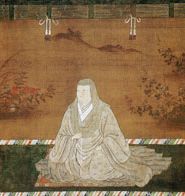 Portrait of O-ne
Portrait of O-ne One example of a warriors deciding to change of mind on his wife`s advice involves Hashiba Hideyoshi. Hideyoshi, who was one of Oda Nobunaga`s retainers, was granted the lands of Ōmi Sangun (Ika, Higashi Asai, and Sakata) in northern Ōmi province in the first year of Tenshō (1573), lands that formerly belonged to the Asai family. He also acquired Odani castle as his residence, which formerly belonged to Asai Nagamasa. (217) One problem was that Odani castle was located on mountain, hence Hideyoshi decided to build a new castle in the vicinity of Lake Biwa and move his household there. (217) This castle would be known as Nagahama.
In order to build a town around Nagahama, a proposal was made whereby `if you move to and reside at Nagahama, you will be exempt from all forms of tithes and taxes`. It was a strategy to attract merchants and workers to the town. Many took up the offer, and soon merchants and workers had made their way to Nagahama to live and took up residence in the town, which arose a short time later. No sooner had they done this, then an order was issued whereby `both annual tithes and land taxes will now be collected`. (217)
Hideyoshi`s wife O-ne (お禰), once she heard of this change of plan, urged Hideyoshi to rescind the order via way of her `opinion`. I will quote from part of a letter of Hideyoshi`s associated with the `Kawaji Bunsho` collection, which is thought to record these events in Tenshō 5 (1577). To continue on from the part of the document that includes the decision to impose tithes and taxes…
“Although I tried to explain to her otherwise, O-ne refused to agree, and as before told me that if I were to forgive all taxes, this would be an act of good governance`. (217-218)
In short, Hideyoshi conceived of the idea to exempt all tithes and taxes in order to ensure that the town of Nagahama rose quickly by enticing merchants and workers to live there. However once this goal had been achieved, and given that tithes, land taxes and other forms of taxation were an important source of revenue, the decision was made to change the policy on tax collection. We don`t really know the extent to which O-ne was involved in the creation of the town of Nagahama, yet when she learned of Hideyoshi`s change of plan, she aired her opinion, which was `what you are proposing is different to what you told the merchants and workers`. In the end, Hideyoshi accepted O-ne`s opinion, rescinded his order, and exempted the townspeople from tithes and land taxes.(218)
The above example of Hideyoshi and O-ne is one of the head of the household accepting his wife`s `opinion`, yet in the case of Maeda Toshiie and his wife Matsu, we have an example of a husband dismissing his wife`s opinion. This event in recorded in the `Kawasumi Taikakuki`, and is quite a fascinating episode linked to the Battle of Komaki and Nagakute in Tenshō 12 (1584). (218-219) The Battle of Komaki and Nagakute was, as is well known, was a conflict that took place in both Owari and Ise between the forces of Tokugawa Ieyasu and Oda Nobukatsu on one side and Hideyoshi on the other. Yet it was not confined to these areas, and also spread as far as the Hokuriku region (which housed the Maeda family). (219)
Maeda Toshiie, as lord of Kaga and Noto and allied to Hideyoshi, and Sasa Narimasa,as the lord of Etchū and allied to Ieyasu and Nobukatsu, began to fight one another along the border area to Etchū. When Toshiie began to assemble his forces, he was thinking of nothing else, and was somewhat flummoxed by the whole process. Toshiie`s wife Matsu, seeing him like this, took gold and silver from the treasury in Kanazawa castle, placed it in a leather pouch, and then spread it out at Toshiie`s feet. It was said…
“Matsu gave her opinion both day and night, saying that right now, you (Toshiie) have no need for the gold and silver of the treasury. If you are going to meet a formidable enemy, you first need to train people. This is indeed the best way. When you finally subdue a country, then you will find that you have need of funds. This is both the beginning and end of countries, and you will need to store both silver and gold. Right now, this money will not be able to thrust a spear”.
What deserves our attention here is the fact that whether at night or during the day, Matsu said to Toshiie `Don`t just collect money, train your troops`, thereby giving her opinion. As gold and silver itself could not wield a spear, Matsu, as a result of the household not listening to her opinion, expressed her indignation at the Maeda household for panicking because they lacked military preparedness. (219-220
In this age of dominant fathers as head of the household, and when it was said that `if the hen crows, the household will fall`, it was considered improper for a woman to express her opinions on matters concerning the household. Women were to be silent and obey the will of their husbands. Hideyoshi`s wife O-ne, and Toshiie`s wife Matsu, were two special exceptions to this belief.(220)
 RSS Feed
RSS Feed